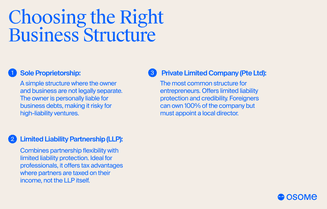How to Start a Business in Singapore From India: Essential Steps for Success
- Modified: 16 April 2025
- 11 min read
- Starting a Company


Heather Cameron
Author
From expert guidance and helpful accounting tips to insights on the latest trends in fintech, Heather is here to empower entrepreneurs and small business owners in Singapore with great content. With a background in digital marketing spanning eight years, she has experience writing for various industries and audiences. As Osome’s copywriter, she’s here to inform and inspire our readers with great storytelling.

Nisah Rahim
Reviewer
Nisah Rahim is our go-to expert reviewer for all things Corporate Secretary-related in Singapore. As the Corporate Secretary Team Lead and content reviewer, Nisah meticulously examines our blog posts to ensure we provide comprehensive information on Corporate Secretary services such as local regulatory compliance, managing board meetings, maintaining company records, and providing expert advice on corporate governance matters.

Imran Marican
Reviewer
Imran Marican, ATA SCTP member, is our Corporate Tax Assistant Manager based in Singapore, with almost a decade of experience in Singapore corporate tax. With in-depth knowledge of Singapore corporate tax law and regulations, he can help with corporate tax compliance that matters to every company. While our business writers transform complicated tax jargon into easy-to-understand concepts, as a reviewer for the Osome blog, Imran ensures our content is accurate and relevant, helping our readers boost their businesses with helpful tips and insights.

Kelly Yik
Reviewer
Kelly Yik, our Accounting Team Lead based in Singapore, ensures that the team meets quality standards and follows accounting standards (SFRS) while remaining compliant with all the authorities' rules and regulations in Singapore. With six years of experience in Singapore accounting, she knows the ins and outs of financial reporting standards, GST, and corporate tax like nobody's business. Kelly supports our blog writers by carefully reviewing our content, making sure it's accurate, up-to-date, and packed with helpful tips for Singapore businesses. So, you can trust the info you get on our blog is not only interesting but also reliable!
Wondering how to start a business in Singapore? This comprehensive guide will help you understand the necessary steps behind establishing a Singapore company from choosing your company structure to registering your venture and fulfilling legal requirements.
Key Takeaways
- A business in Singapore can benefit from favourable tax regimes, accessible funding options, and a strategic location for foreign entrepreneurs.
- Choosing the appropriate business structure – sole proprietorship, limited liability partnership, or private limited company – is vital for managing liability and operational flexibility.
- The business registration process in Singapore is straightforward, involving name reservation and filing with ACRA, along with compliance with KYC requirements and ongoing legal obligations.
- Local and foreign entrepreneurs in can apply for an employment pass to bring foreign management talents into their business in Singapore.
- A foreign company can open a representative office before establishing a permanent entity in Singapore.
Why Start a Business in Singapore?
Singapore consistently ranks high for ease of business, placing second in the 2020 World Bank Ease of Doing Business Survey. Singapore’s streamlined processes and supportive regulatory framework make it an attractive destination for foreign businesses. Furthermore, Singapore government agencies, such as the Economic Development Board, are known for their low levels of corruption and offer various programs and grants to support startups and SMEs.
The tax environment is also favourable, with a corporate tax rate of 17%, no capital gains tax, and exemptions on the first S$ 100,000 of income for the initial three years for new businesses. However, these benefits are subject to the approval of the Inland Revenue Authority of Singapore (IRAS).
Companies that qualify for the Start-Up Tax Exemption (SUTE) can enjoy exemptions on their chargeable income, with the first S$ 100,000 at 75% and the next S$ 100,000 at 50%. If they do not qualify for SUTE, they can still benefit from a partial tax exemption, with the first S$ 10,000 at 75% and the next S$ 190,000 at 50%. This favourable tax regime allows businesses to retain more of their earnings, which can be reinvested for growth and development alongside the goods and services tax (GST) considerations.
Singapore’s strategic location in Southeast Asia provides businesses with unparalleled access to major Asian economies. Its port is one of the busiest in the world, facilitating smooth international trade. Additionally, Singapore boasts a highly-skilled, multinational workforce. This educated and diverse talent pool contributes significantly to the service-based economy, which accounts for 75% of the GDP. The various foreign talent visa options, including employment passes, work visas, and other visa options, also make it highly efficient for companies to bring talent in from overseas.
These benefits position Singapore as a gateway to the broader Asian market, making it an ideal place for new ventures. With innovative business ideas and a solid business plan, entrepreneurs can leverage these benefits to build a successful enterprise. Hence, Consider establishing a business in Singapore for your next venture.
Choosing the Right Business Structure
The structure of your Singapore company affects liability, taxation, and operational flexibility. In Singapore, the primary structures include sole proprietorship, limited liability partnership (LLP), and private limited company.
Each structure offers unique features and benefits, so align your choice with your business plan and goals.

Sole Proprietorship
A sole proprietorship is owned and operated by an individual without a separate legal identity from the owner. This means that the owner is personally liable for all business debts and obligations, which can be a significant risk, particularly for ventures that are not risk-free. The starting registration fee is SGD 175 for a three-year registration.
While this structure is easy to set up and manage, it is not recommended for high-risk ventures due to the unlimited personal liability involved. Additionally, non-Singaporean citizens cannot establish a sole proprietorship in Singapore. However, a sole proprietorship could be the right choice for a small business that's just off the ground.
Foreign business owners should consider business structures that provide limited liability and better protection for personal assets as a separate legal entity. Check our comprehensive guide here to make the right decision: Sole Proprietorship vs Pte Ltd: The Best Choice in Singapore.
Limited Liability Partnership (LLP)
A Limited Liability Partnership (LLP) combines the flexibility of a partnership with the benefits of limited liability, making it a favoured business structure among professionals. A limited partnership allows two or more individuals and/or corporations to operate a business while enjoying protection against personal liability for business debts. The minimum capital requirement to register an LLP in Singapore is S$ 1, making it accessible for small business ventures.
Registering a Singapore business as an LLP usually takes about one week and requires at least one Singapore resident manager. LLPs are also tax-exempt, so the corporate entity does not pay taxes. In contrast, each limited partner pays personal income tax, simplifying tax management and potentially reducing overall tax liabilities.
Private Limited Company
A Private Limited Liability Company (Pte Ltd) is the most common type of Singapore business entity and operates as a separate legal entity. It protects shareholders and safeguards their assets against business debts and obligations. Additionally, financial institutions find a limited liability company more favourable, making it easier to secure funding.
A foreign parent company can own 100% of the newly established company in Singapore by appointing a local director. Hence, foreign companies often use this structure to establish a subsidiary company to conduct business in Singapore.
A Pte Ltd can have between 1 and 50 shareholders, providing flexibility in ownership structure. The minimum capital requirement to set up a private limited company is S$ 1, making it accessible even for startups.
Public Limited Company
A public limited company is a business owned by the general public. The company can be limited by shares or by guarantee and offers unique opportunities to raise funds by issuing share capital or company ownership. However, public companies are under more scrutiny and must abide by additional compliance regulations outlined by the Singapore company law. The public limited company operates as a separate legal entity and protects shareholders and guarantors with limited liability.
Steps To Register Your Business From India
Registering a new business entity in Singapore from India is simple since one can register for a business in Singapore online. The Singapore company registration process consists of two main steps: reserving a business name and registering the business with the Accounting and Corporate Regulatory Authority (ACRA). Once you've paid the company registration fee and submitted all materials, it typically takes 1 to 3 days to complete the registration.
If you're registering a representative office in Singapore, you will register with International Enterprise (IE) Singapore instead.
Reserving a business name
Reserving a business name is the first step in the company registration process. You must apply through ACRA via the BizFile portal for a fee of S$ 15, which reserves the name for up to 120 days. Ensuring that the chosen name is unique and meets all regulatory conditions is crucial. Avoiding restricted terms like ‘bank’ or ‘finance’ will help prevent delays in the registration process.
Specifying the type of business activity for statistical and licensing purposes ensures legal recognition and exclusive rights to use the name in Singapore. For example, you may want to register for trademark and intellectual property.
Gathering all necessary documents
You must gather a few important documents from India to register a business in Singapore. Some of these include proof of local registered address, a bank account statement, a company narrative, details of directors and shareholders, and your company constitution.
Filing with ACRA
Once you have reserved your business name, the next step is to file with ACRA. To register a company in Singapore, the owner must be over 18 years of age. You also must appoint a local director and a company secretary within 6 months and submit an SSIC code corresponding to your business activities during this filing.
The company secretary ensures compliance with statutory requirements, whereas the local or resident director can streamline the process and help you navigate the complexities of Singaporean regulations, ensuring that all necessary documentation is submitted correctly and on time.

Appointing key personnel
Appointing key personnel is a vital step in the company incorporation process. A company must have at least one local director to meet the requirements for company setup in Singapore. The local resident director oversees company operations and ensures compliance. By ensuring key management personnel in Singapore, companies can become entitled to DTA benefits like local companies.
In addition to a local director, you must appoint a company secretary within six months of incorporation. The company secretary’s role includes maintaining company records, preparing meeting minutes, and ensuring that all statutory filings are completed on time.
Having the right personnel in place is essential for the smooth operation and legal compliance of your business.
Setting Up a Registered Office Address
To be considered a local company, your Singapore company must have an operational local registered office address open to the public during standard business hours. Since renting a physical office space can be costly, you can use a virtual office that provides a professional business address without the expense of a physical office.
Complying with KYC Requirements
Complying with Know Your Customer (KYC) requirements is essential for verifying the identities and backgrounds of individuals or entities involved in company establishment. This process involves confirming the identities of directors, shareholders, a corporate secretary, and beneficial owners through documents like identification proof and company resolutions. Verification can be conducted using both electronic and physical documents alongside independent data sources.
Opening a Corporate Bank Account
A corporate bank account ensures financial security and effective business management, enhances company credibility and simplifies tax preparation. To open a business bank account in Singapore, you will need a completed account opening form, your business plan, notarised ID documents, and incorporation documents.
Foreigners may need to be physically present to open business bank accounts. The timeframe for opening a corporate bank account typically ranges from 1 to 4 weeks, depending on the company’s structure and documentation.
Selecting the right bank involves evaluating reputation, service variety, and security measures. Many banks in Singapore offer multi-currency accounts, facilitating international business transactions.
Understanding Tax Obligations
Singaporean companies are taxed on chargeable income at a fixed rate of 17%, and filing corporate income tax returns is mandatory for all companies, regardless of profitability. The estimated chargeable income must be reported within three months following the end of the financial year. Businesses can also voluntarily contribute to the Central Provident Fund (CPF) for up to half of the required contribution amount from each employee's wages.
New companies receive notifications to file their estimated chargeable income starting the year after incorporation. Businesses must maintain proper records of business finances for at least five years from the relevant Year of Assessment. The Double Tax Deduction for Internationalization also offers a 200% tax deduction for eligible expenses related to expanding a business internationally. However, it is important to note that only specific activities qualify for this deduction, and there is an expenditure cap: $100,000 per Year of Assessment (YA) for expenditures incurred from 1 April 2012 to YA 2018 and $150,000 per YA for expenditure incurred from YA 2019 to 31 Dec 2025.
Many businesses use accounting software to automatically monitor and record the activities in their corporate account to ensure tax compliance and proper documentation.
Hiring Employees

In Singapore, the Employment Act outlines worker protections and rights, whereas the Fair Consideration Framework (FCF) ensures fairness in hiring and job opportunities.
Employers must pay CPF contributions for Singapore citizens or Singapore permanent residents who earn over S$ 50 monthly. The employer must contribute to employees earning between S$ 50 and S$ 500, but the employee does not.
Foreign workers must have a university degree and a minimum salary of S$ 6,000 to be hired in Singapore. Employers are also required to buy work injury compensation insurance when hiring employees.
Ongoing Compliance and Reporting
Ongoing compliance and reporting are essential for maintaining the legal standing of your company in Singapore. All companies are required to conduct an Annual General Meeting (AGM) each calendar year and file their annual return within one month after the AGM. Financial statements must be presented at the AGM for the approval of shareholders.
Filing financial statements in XBRL format is mandatory for most incorporated companies unless exempted. Small companies can prepare unaudited financial statements if they meet specific criteria regarding revenue and assets. Penalties for failing to meet ACRA compliance requirements vary based on the duration of the default.
Resources for Business Owners From India
The Singapore government offers various grants and funding options to support business owners. The Startup SG Equity Programme allows for co-investment with qualified third-party investors, promoting local startup growth. The Temporary Bridging Loan Programme provides loans up to S$ 1 million at a capped interest rate to registered businesses in Singapore.
Additionally, the Productivity Solutions Grant supports companies that adopt IT solutions to improve processes, covering up to 50% of costs. The Business Improvement Fund provides significant funding for qualifying costs, specifically aimed at tourism sector businesses. Leveraging these resources can significantly enhance your business’s chances of success.
Summary
In conclusion, starting a business in Singapore from India is a promising venture, thanks to the country’s favourable business environment, strategic location, and supportive government policies. By following the outlined steps, from choosing the right structure to understanding tax obligations and leveraging available resources, entrepreneurs can set a strong foundation for their business.
Take advantage of the opportunities Singapore offers and embark on your entrepreneurial journey with confidence. Partner with Osome for fast incorporation and seamless accounting services. With Osome’s expertise and software, you’ll navigate the complexities of the Singapore market effortlessly, allowing you to focus on growing your business.






